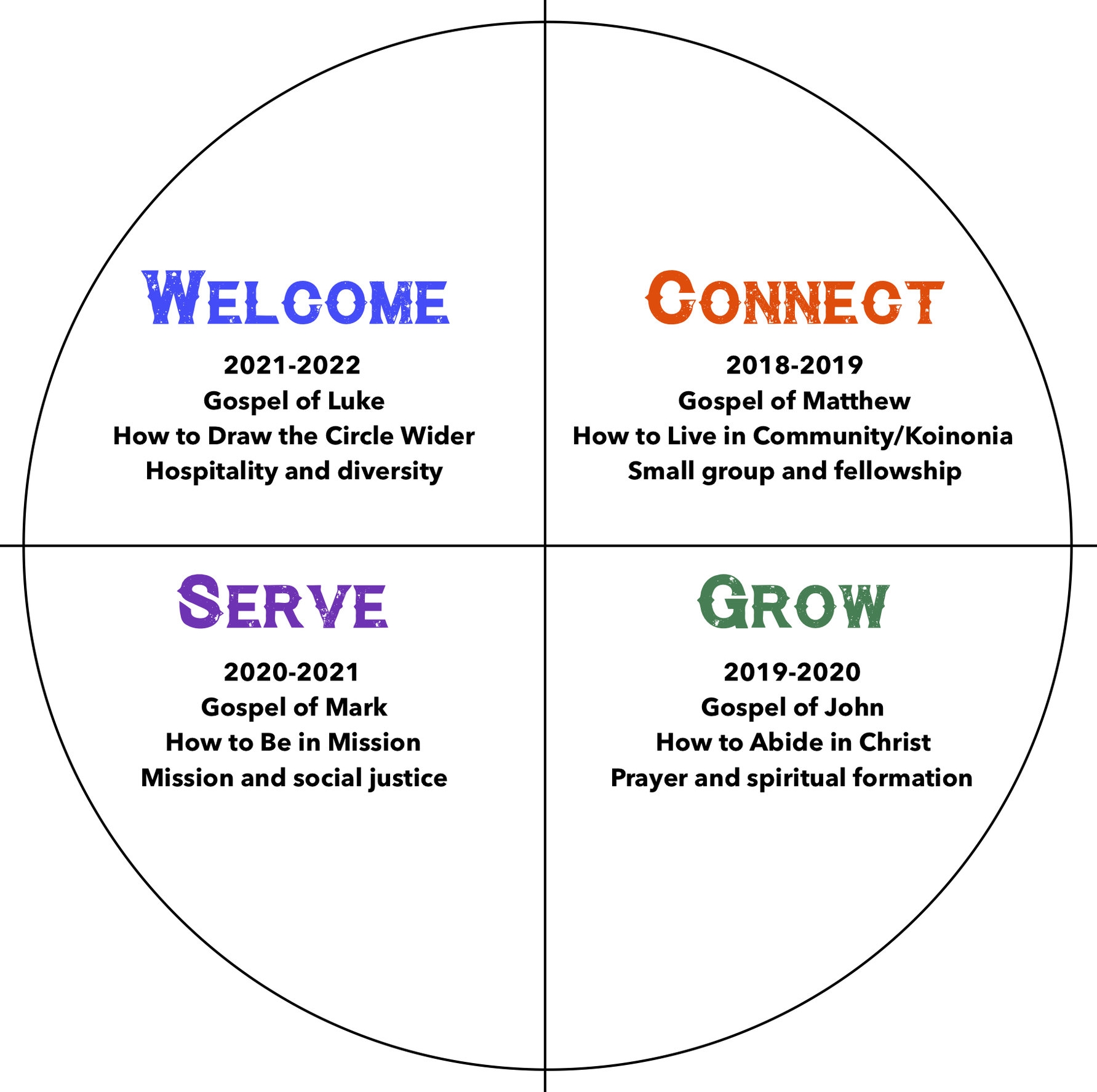This is The Way
/I am always happy when the summer comes to an end.
Not just because the heat starts to abate just a little … nor because my kids have all left the house for college … but because I love having all of you around for worship, Wednesday nights, and weekday evenings again!
Summers at KPUMC are sloooooooow.
But when school starts, everyone gets interested in church again.
That makes this a good time to announce the roll-out of The Way.
Let me start at the beginning … last fall, I called together a group of new-ish church members to a Vision Task Force. Over the course of a few months, this task force put together a set of recommendations for the church, including a new mission statement.
The new statement, adopted by the Church Council this summer, reads, “As disciples of Christ at Kessler Park UMC, we: Welcome all people, Connect with one another, Grow closer to God, and Serve the community.”
Those four words — Welcome, Connect, Grow, and Serve — form the basis of a discipleship path, or a kind of basic direction for adult training in discipleship. Since I’ve been appointed to KPUMC, I have been searching for a way to orient and align our programs and ministries to correspond with a clear discipleship path.
Put another way, I’ve been looking for language about how to invite people to follow Jesus, and then give them the tools to actually do so. I think these four words accurately sum up that path. First, we are welcomed into a faith community and experience hospitality; when we are comfortable, we seek to connect with some of the members of that community outside of the worship experience, usually in some kind of small group; as a result of this connection, we begin to grow spiritually and find ourselves getting closer to God through Jesus Christ; and as an expression of our gratitude to God, we develop our spiritual gifts and put ourselves into Christian service of others. Then we find ourselves welcoming new people into the community … and the process starts all over again.
At some point, I recognized that each of these four concepts correspond with one of the four gospels. Thus, the idea of being welcoming, hospitable and inclusive aligns neatly with the Gospel of Luke, which is focused on Jesus’ ministry to outsiders; the idea of spiritual growth fits with the Gospel of John, which is mystical and urges us to “abide with Christ.” The Gospel of Mark’s emphasis on radical discipleship points us toward service, and the Gospel of Matthew focuses on the new community and connections formed by the good news of Jesus.
I have decided, then, as your primary preacher and teacher, to focus on each one of the four gospels over the next four years, beginning with the Gospel of Matthew, and focusing on the key question that Matthew seeks to answer, “How does God intend for us to live together in community?”
To that end, I am creating a 24-week core course on Matthew which will be offered to all church Sunday School classes in September. The first 16 chapters of the book will be covered in the fall; the rest of Matthew will be covered in spring 2019. I will be writing a study guide with class instructions, and preparing a 5-7 minute video for each week’s lesson.
In addition, Wednesday Night Live adult classes will focus on the same theme. This fall, I will offer a class entitled“Reading Matthew with New Eyes” and Mike Smith will lead a study on community using the Nooma video series by Rob Bell. In the spring, I will offer a class on“The Sermon on the Mount.”
At this point, you may be wondering, “OK, but what’s the big deal? So we’re studying Matthew …” Here’s the exciting part: the Sunday School course and Wednesday night classes will all be offered online, as well as in person.
If you can’t be here on Sunday morning or Wednesday night, you can still participate in the learning, the discussion, the spiritual formation! And not only will you be able to participate, but people who are not currently members of our faith community can, too!
Everything that will be used in the class will be available online — the content, handouts, slides, videos, and discussion. I’m also planning to make additional content available online, including podcasts, interviews with Bible scholars, ebooks, and occasional live gatherings.
I’m calling this entire project “The Way.” That’s not an arbitrarily chosen name. Did you know that the first name for the new Jesus movement in the New Testament was “The Way”? Five times in the book of Acts, the movement is called “The Way,” including 9:2, 19:9 and 23, 24:14 and 22.
I love the name because it indicates that we are on a path, following a direction. We don’t have all the answers, nor do we live by a bunch of rules. We’re simply going to follow Jesus together on this way.
I can’t wait to get going … stay tuned for the details!



